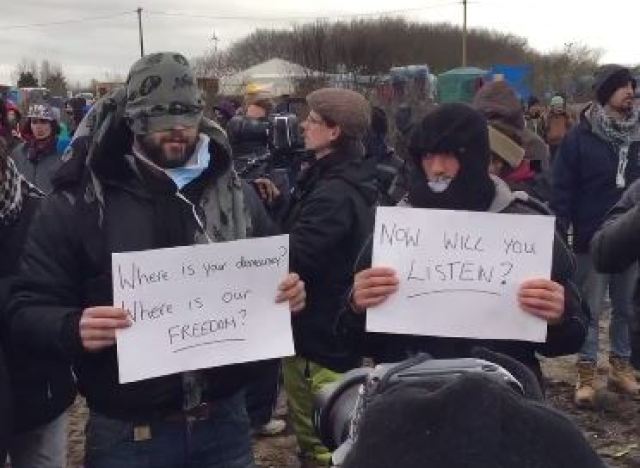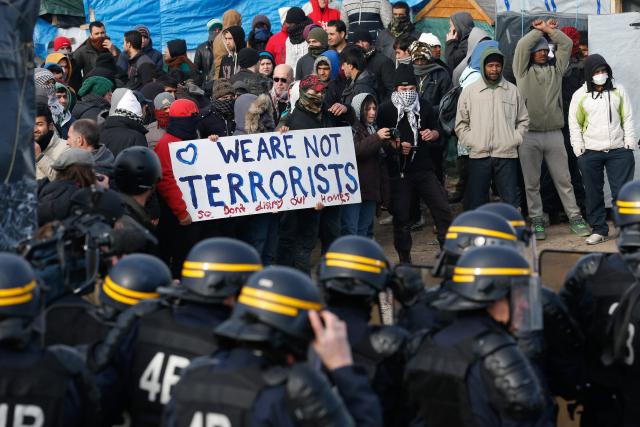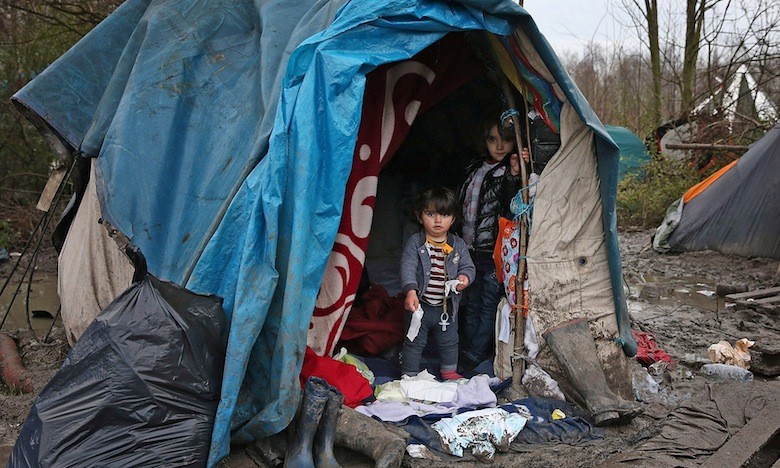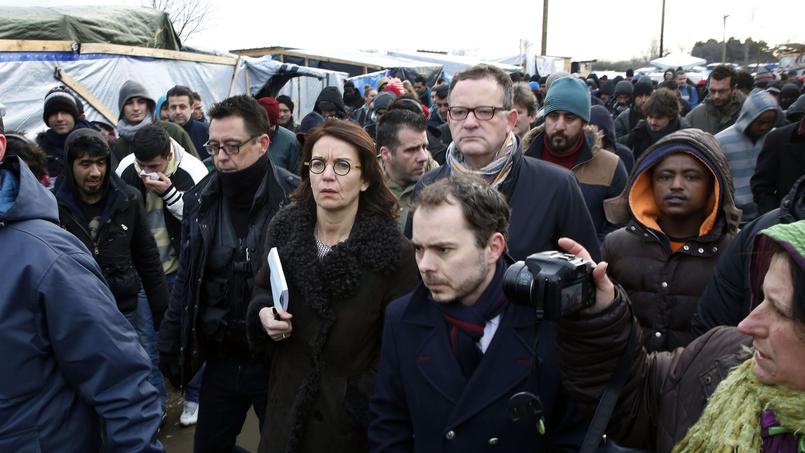We arrived in Calais after walking for two weeks in beautiful and remote Lapland in the Arctic north of Sweden, and we’re now traveling around Spain in a campervan – two very different experiences from the volunteering!
Over the three weeks in Calais, we volunteered with Care4Calais and Auberge/Help Refugees, two grassroots organisations that provide the majority of food, clothes, shelter and other support to the camp.
The camp has existed for over 20 years, but has grown massively over that time.There are currently around 9000 people living there, and more than 10,000 people are expected to be there by the autumn. People come and go each day – we met new arrivals each time we went in, often groups of young men with no tent, no blanket, no change of clothes. I spoke to people who’d been in the camp for just a few days, and others who’d been there for over a year.
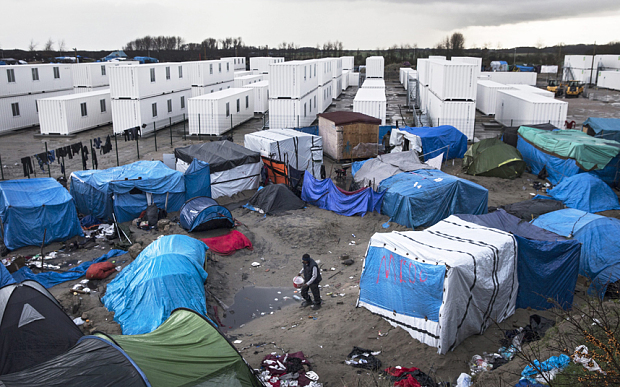
A migrant walks among the tents and huts of the makeshift camp called ‘The Jungle’ next to the fenced area made of containers recycled in rooms to host some 1,500 migrants in Calais, France, 10 January 2016. A new area of the camp will be inaugurated on 11 January as containers recycled as rooms will host its first occupants. Only half of a capacity of 1,500 places will be filled during the days. Between 4,000 and 7,000 migrants are currently living in ‘The Jungle’. EPA/ETIENNE LAURENT
The vast majority of people in the camp are young men, but there are also women and children living there. Most people are in the camp because they want to get to the UK and claim asylum there. Over a third of camp residents have family in the UK; many speak English as their second language. Another major attraction to the UK is that it is often seen as wealthy and safe, with kind people and less brutal police. When we told people where we’re from they would say things like ‘good, good, UK is very good’. It was hard to know what to say to them, knowing what life as an asylum-seeker would be like if they ever manage to cross the border.
We met people from Sudan, Afghanistan, Pakistan, Ethiopia, Eritrea, Syria, Iran and Kuwait. There are also people from Iraq, Libya, Rwanda, Romania and elsewhere. The biggest communities by far are Sudanese and Afghani.
The camp is made up of make-shift structures that stretch out over a large area of sand dunes next to the Calais ferry port. Many people sleep in second-hand tents, some in more robust structures made of wood and tarpaulin, and a few in caravans. While the weather was mostly sunny for the whole three weeks, after just one night of rain many shelters had completely flooded, with people’s blankets and clothes soaked through. One man Ellie spoke to just pointed at his floor, where water was leaking up from the ground, and said, ‘please help me’.
There are two schools in the camp called Darfur School and Jungle Books, which teach English and French from 11am to 7pm every day. There’s also a youth centre, a women and children’s centre, a church, a mosque, a football pitch, and dozens of cafes, shops and restaurants made from wood and tarpaulin, which have been set up by people living in the camp. These sell tea and coffee, hot meals, food, toiletries, and other goods.
Medecin Sans Frontieres (as far as we saw, the only major aid organisation operating in the camp), runs a mental health clinic and there are also two medical caravans staffed by voluntary nurses and doctors. Both are overwhelmed. We met people with bad physical injuries they got jumping on and off lorries and trains in their attempts to cross the Channel in the only way you can if you don’t have the right passport: illegally, clandestine. This is called the ‘try’, ‘chance’ or ‘game’, and is extremely dangerous. Two weeks ago, a funeral was held for a Sudanese man who was run over by a truck on the motorway, which didn’t even stop after hitting him. His friend told Ellie that 20 Sudanese men alone have died trying to cross.
Many more residents are mentally scarred from the awful things they have seen on their long journeys, and beforehand in the home country – what forced them to leave. They often don’t want to talk about it. Those who do told us of how cruel the police tend to be when they catch them trying to cross. Rather than arrest them and treat them decently they often just push and pull them around – or worse; spray tear gas in their face; and leave them to walk back to the camp – potentially many miles.
The atmosphere was particularly tense and uncertain while we were there because the police have been trying to close the restaurants, cafes and shops. One day Ellie saw dozens of riot police, armed with shields, tear gas and guns with rubber bullets, move down the main street seizing van loads of food and drink, from prop population struggling each day to find enough to eat. It isn’t just French police who treat refugees like this, by any means. And there are undoubtedly much more compassionate police, but the overwhelming picture we got was one of brutality.
In addition, there is some fighting within the camp, often between different national groups. Whilst a were there, an Ethiopian man was stabbed to death. This is tragic, but you can see why – in such awful conditions – tensions can erupt into violence.
As for what drives people away from their homes, we were very moved talking to two Afghan men, both a bit younger than myself, both so friendly, who had worked as interpreters for NATO during the war, and had since become at risk given the resurgence of the Taliban: they could be killed as collaborators. As you can imagine, after my nearly-four years at ForcesWatch, hearing how these people were not guaranteed asylum by the rich bellicose countries who employed them, really angered me.
Not that anyone in the camp is more or less deserving of asylum; whether because of war or poverty or another threat, it was patently clear that everyone had been forced there. And no-one would chose to live there. There are some portaloo toilets, apparently provided by the French government, but these are overflowing and the areas surrounding them stink of sewage. The camp fails to meet international humanitarian standards on many fronts, including because there are so few toilets per person. The camp is also overrun with rats, which crawl across people while they sleep.
While some people we spoke to from Calais are sad about the situation, and have volunteered, in general the local community is hostile towards the camp and most want it to disappear. We saw a picture a child from the camp had drawn of white men attacking tents with knives and sticks, which apparently has happened.
Daily life in the camp tends to start around 1pm, as most people are up all night trying to cross the Channel. In the afternoon, people tend to hang out in their shelters; cook, buy or queue for food; and sleep. Some go to English and French lessons. Some go into Calais itself, but many people Ellie spoke to said they don’t feel safe there and wouldn’t go alone. Francoise Hollande and Interior Minister Bernard Cazeneuve said that despite Brexit, the 2003 Touquet accord between France and the UK – which effectively moved the UK’s border to the northern shores of France – would not be renogotiated. However, the Mayor of Calais Natacha Bouchart has stated: “We can’t take it anymore… I demand that we renegotiate the Touquet accord”.
In total, there are currently around 600 unaccompanied minors living in the camp, some of who are primary school age. The UK government made a commitment to bring them safely across the border months ago, but nothing has yet been done. The second of the two Afghan men I referred to above told me that a UK government official visiting the camp’s legal centre said to him, ‘you can go back to Afghanistan, it’s safe there’, which is just outrageous in its ignorance and lack of compassion.
And yet, and yet, somehow in the midst of all this, so many of these people still have the energy to be kind, welcoming and light-hearted. When we went into shelters, we were offered tea, coffee, biscuits, and other food. The general atmosphere – from my perspective as a volunteer at least – was amazingly warm and friendly. Most people wanted to chat, joke, and practice English. People were quick to smile and shake our hands.
One piece of good news is that an attempt by Calais authorities to demolish 72 restaurants and cafes was rejected by a French court on 19 August. These spaces are so important in the camp – while they are make-shift structures, they provide community spaces that stay dry in the rain and cool in the sun, giving people the only available choice over what and how they eat each day. They also provide new arrivals with a place to sleep. One of the cafes under threat was the kids’ cafe, one of the only spaces for young people in the camp, which also provides legal advice for children.
A large part of the camp was demolished by police earlier this year, where there’s now just a large grassy area covered with yellow flowers. Some of the people who were living there were moved to “the containers” – rows of ship containers where people sleep in bunk beds. If you move there, you have to provide your fingerprints and so lose all hope of claiming asylum in the UK. There are rumours of another major eviction in September, as well as of plans to close the camp entirely, with no information as to where people would be expected to go.
Volunteers aren’t allowed into the container area, which is guarded by police, so we don’t know much about the situation there. While some support is provided by the French government, we were told that there were often up to 12 people sleeping in one small container, and many people still needed or chose to continue eating their meals in the camp.
When the police aren’t taking food away or evicting, they sit in parked vans outside the camp’s entrances and along the fence around the port (which apparently cost the UK £6 million to build). On several occasions, the police refused entry to volunteers because they didn’t have ID with them.
We spent most of our evenings in Calais walking along the beach, where, on a sunny day, you can see the cliffs of Dover across the water. People have sacrificed everything to make the journey to Calais, risking their lives over and over, and often enduring months or years of no contact with the people they love. They have made it so far, but must now live through the Calais camp because of 20 miles of sea. Some people I spoke to said they wish they’d never left home, that it’s better to risk bombs than to live without your family. And yet so many people living in the camp continue to act with such hope – finding the energy not only to survive, but to learn English and French, to be so kind to people around them, and to try each night – under horrific circumstances – to cross the border.
I’ll finish with a little insight into the work of Auberge/Help Refugees and Care4Calais, and what you could do to help.
Auberge des Migrantes is a French organisation which has been delivering aid to the Calais and other refugee camps in France for years. It partnered last year with the UK organisation Help Refugees, in response to the vast quantity of donations for the camps coming from people in the UK. They have a very large warehouse near the camp where every day a mixture of long and short-term volunteers sort through donations (food, clothes, tents, toiletries etc), cook a lunch for around 2000 camp residents, distribute all these things, and help repair and improve people’s tents and shelters.
We spent our last five days at Auberge, mostly in the kitchen doing masses of vegetable chopping and washing up.
This was repetitive work, but we appreciated the contrast to Care4Calais. Care4Calais was set up last year to take a more hands-on approach to volunteering. Whereas at Auberge only volunteers staying a week or more tended to go into the camp, at Care4Calais most volunteers go in every day. This is partly due to their varying capacity; Auberge are far bigger, with 200 or more volunteers each day while we were there, as opposed to between 30 and 60 at Care4Calais.
We were at Care4Calais for twelve days. Volunteers spend the morning at the warehouse, doing similar work to Auberge except Care4Calais don’t provide cooked food to the camp. In the afternoons we went into the camp in one of three roles: teaching English (and French for those who could) informally in certain spaces of the camp, which ranged from teaching the alphabet/numbers/basic vocab to having a fluent conversation (and was always an exchange, in that residents would teach us some of their language – i now know a little Arabic and a few words in Pashtu); distributing clothing, toiletries and food from a shipping container or van; and going meticulously around tents and shelters giving out tickets to each person for the clothing and/or toiletries distribution, based on what they need most.
This work is far more mentally/emotionally tiring than warehouse tasks, but we were glad to have been able to engage with people in the camp, as this was where we learned the most – from hearing people’s stories, and seeing the challenges of aid work for such relatively-limited organisations in such a large and growing camp. We also saw how camp residents lend their skills as volunteers themselves, most often as translators.
The Care4Calais ticketing system was very new, and came in response to feedback from the weekly meetings between Auberge, Care4Calais and community representatives that distributing to whoever turns up was resulting in the same people queuing repeatedly while those new to the camp or unaware of the distribution locations or times got nothing. As far as we understand, Auberge does not do targeted distribution.
The two organisations are both doing excellent, literally vital work. Neither is perfect, and there is an argument that they could be working together more closely.
Our fellow volunteers were lovely. They came from around the world, though most were – unsurprisingly – from the UK, France and Spain. We had many interesting conversations with them, and made several new friends.
Ellie Roberts
Owen Everett
If you feel moved to take action to help those in the camp, there are several things you can do:
* give money to Care4Calais and/or Auberge. Money is more useful than physical donations, as a lot of donations are actually not good-enough quality, or do not cover certain shortages such as gas for cooking, or fresh ingredients for the cooked good distribution.
http://www.helprefugees.org.uk/donate
http://care4calais.org/donate
* donate food, high-quality or new clothes, or other much-needed items from these lists:
www.helprefugees.org.uk/2016/08/08/calais-needs-items-needed-as-of-monday-8th-august/
Photos, films, and further reading:
short video interviews with some of our fellow Care4Calais volunteers on why they volunteered, and how they found it:
https://calaiscalling.wordpress.com/2016/07/27/calais-day-10-who-comes-here/
the recent BBC documentary series ‘Exodus’, which is available to watch on iplayer for a few more days: we haven’t watched it ourselves yet but have heard from other volunteers that it’s very powerful, following a few individuals on their horrendous journeys (it uses their own video footage) – http://www.bbc.co.uk/iplayer/group/b07ky6ft
updates from the two main volunteer organisations on the situation in the camps in Calais, Dunkirk, and elsewhere in France: http://www.utopia56.com/en/actu ; http://care4calais.org/latest/
lots of insightful news and comment pieces on the camp: www.theguardian.com/world/calais


